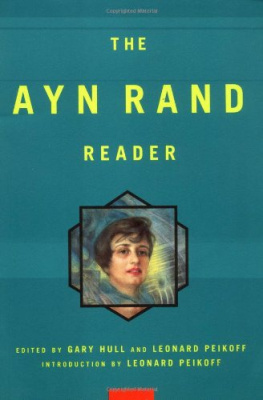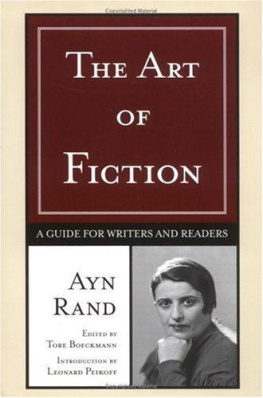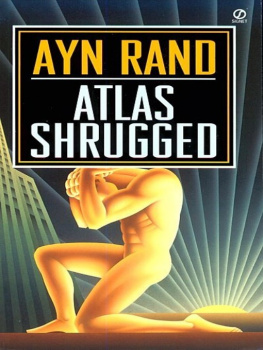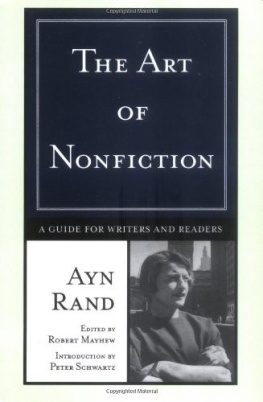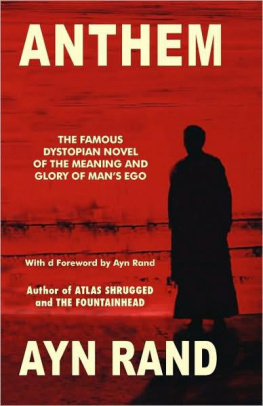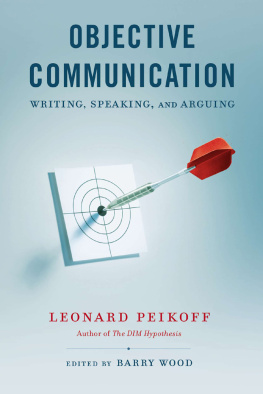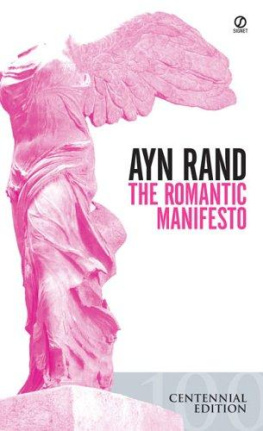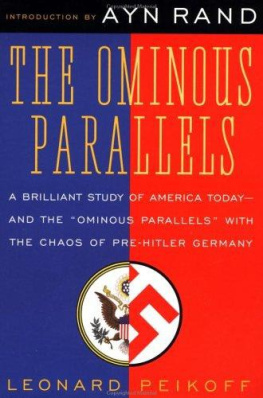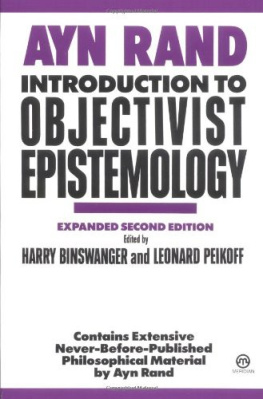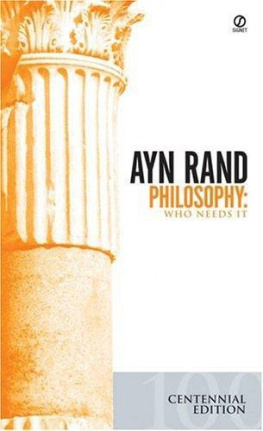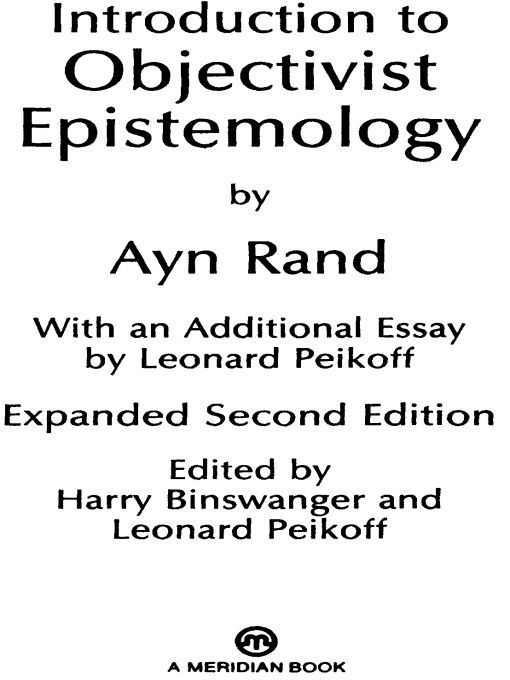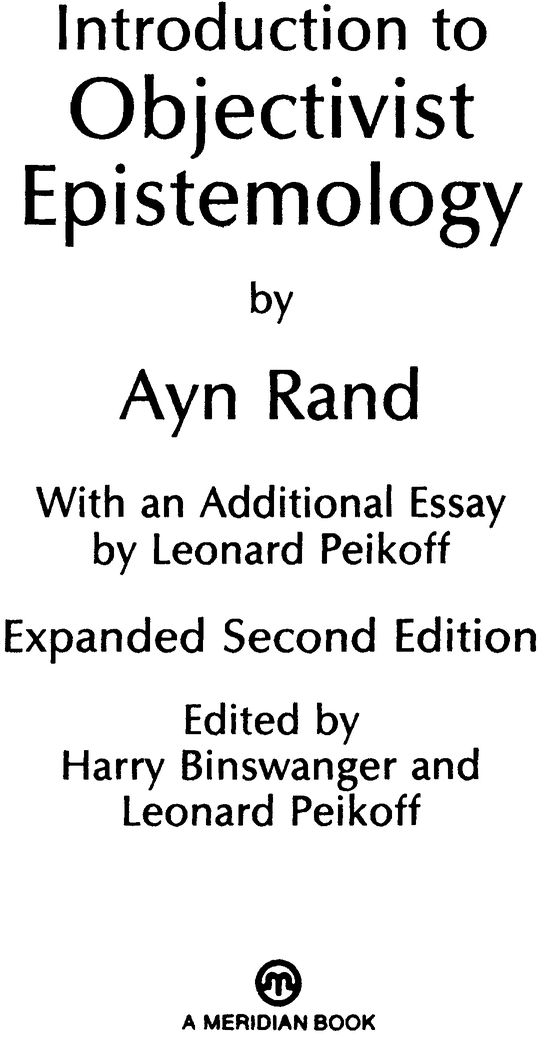Table of Contents
AYN RAND is the author of Atlas Shrugged, philosophically the most challenging bestseller of its time. Her first novel, We The Living, was published in 1936, followed by Anthem. With the publication of The Fountainhead in 1943, she achieved a spectacular and enduring success. Miss Rands unique philosophy, Objectivism, has gained a worldwide audience. The fundamentals of her philosophy are set forth in such nonfiction books as: For The New Intellectual, The Virtue of Selfishness, Capitalism: The Unknown Ideal, and The Romantic Manifesto. Ayn Rand died in 1982.
DR. LEONARD PEIKOFF worked closely with Ayn Rand for many years and was designated by her as heir to her estate. He has taught philosophy at Hunter College, Long Island University, and New York University, and lectures on Ayn Rands philosophy throughout the country. Dr. Peikoff is the author of The Ominous Parallels: The End of Freedom in America (Meridian), and editor of The Early Ayn Rand (Signet). He lives in South Laguna, California.
DR. HARRY BINSWANGER, an associate of Ayn Rand, received his doctorate in philosophy from Columbia University. He has taught philosophy at Hunter College and given courses on Objectivism at the New School for Social Research. Dr. Binswanger is the author of The Biological Basis of Teleological Concepts, and editor of The Ayn Rand Lexicon (Meridian). He lives in New York City.
THE AYN RAND LIBRARY
Vol. I. PHILOSOPHY: WHO NEEDS IT
by Ayn Rand
Vol. II. THE EARLY AYN RAND:
A Selection from Her Unpublished Fiction
Edited by Leonard Peikoff
Vol. III. THE OMINOUS PARALLELS
by Leonard Peikoff, with an
Introduction by Ayn Rand
Vol. IV. THE AYN RAND LEXICON:
Objectivism from A to Z
by Harry Binswanger, with an
Introduction by Leonard Peikoff
Vol. V. THE VOICE OF REASON:
Essays in Objectivist Thought
by Ayn Rand
with additional essays by
Leonard Peikoff
Foreword to the First Edition
(This work was first published in
The Objectivist July 1966-February 1967.)
This series of articles is presented by popular demand. We have had so many requests for information on Objectivist epistemology that I decided to put on record a summary of one of its cardinal elementsthe Objectivist theory of concepts. These articles may be regarded as a preview of my future book on Objectivism, and are offered here for the guidance of philosophy students.
The issue of concepts (known as the problem of universals) is philosophys central issue. Since mans knowledge is gained and held in conceptual form, the validity of mans knowledge depends on the validity of concepts. But concepts are abstractions or universals, and everything that man perceives is particular, concrete. What is the relationship between abstractions and concretes? To what precisely do concepts refer in reality? Do they refer to something real, something that existsor are they merely inventions of mans mind, arbitrary constructs or loose approximations that cannot claim to represent knowledge?
All knowledge is in terms of concepts. If these concepts correspond to something that is to be found in reality they are real and mans knowledge has a foundation in fact; if they do not correspond to anything in reality they are not real and mans knowledge is of mere figments of his own imagination. (Edward C. Moore, American Pragmatism: Peirce, James, &Dewey, New York: Columbia University Press, 1961, p. 27.)
To exemplify the issue as it is usually presented: When we refer to three persons as men, what do we designate by that term? The three persons are three individuals who differ in every particular respect and may not possess a single identical characteristic (not even their fingerprints). If you list all their particular characteristics, you will not find one representing manness. Where is the manness in men? What, in reality, corresponds to the concept man in our mind?
In the history of philosophy, there are, essentially, four schools of thought on this issue:
1. The extreme realists or Platonists, who hold that abstractions exist as real entities or archetypes in another dimension of reality and that the concretes we perceive are merely their imperfect reflections, but the concretes evoke the abstractions in our mind. (According to Plato, they do so by evoking the memory of the archetypes which we had known, before birth, in that other dimension.)
2. The moderate realists, whose ancestor (unfortunately) is Aristotle, who hold that abstractions exist in reality, but they exist only in concretes, in the form of metaphysical essences, and that our concepts refer to these essences.
3. The nominalists, who hold that all our ideas are only images of concretes, and that abstractions are merely names which we give to arbitrary groupings of concretes on the basis of vague resemblances.
4. The conceptualists, who share the nominalists view that abstractions have no actual basis in reality, but who hold that concepts exist in our minds as some sort of ideas, not as images. (There is also the extreme nominalist position, the modern one, which consists of declaring that the problem is a meaningless issue, that reality is a meaningless term, that we can never know whether our concepts correspond to anything or not, that our knowledge consists of wordsand that words are an arbitrary social convention.)
If, in the light of such solutions, the problem might appear to be esoteric, let me remind you that the fate of human societies, of knowledge, of science, of progress and of every human life, depends on it. What is at stake here is the cognitive efficacy of mans mind.
As I wrote in For the New Intellectual: To negate mans mind, it is the conceptual level of his consciousness that has to be invalidated. Under all the tortuous complexities, contradictions, equivocations, rationalizations of the post-Renaissance philosophythe one consistent line, the fundamental that explains the rest, is: a concerted attack on mans conceptual faculty. Most philosophers did not intend to invalidate conceptual knowledge, but its defenders did more to destroy it than did its enemies. They were unable to offer a solution to the problem of universals, that is: to define the nature and source of abstractions, to determine the relationship of concepts to perceptual dataand to prove the validity of scientific induction.... The philosophers were unable to refute the Witch Doctors claim that their concepts were as arbitrary as his whims and that their scientific knowledge had no greater metaphysical validity than his revelations.
These are the reasons why I chose to introduce you to Objectivist epistemology by presenting my theory of concepts. I entitle this work an Introduction, because the theory is presented outside of its full context. For instance, I do not include here a discussion of the validity of mans sensessince the arguments of those who attack the senses are merely variants of the fallacy of the stolen concept.
For the purposes of this series, the validity of the senses must be taken for grantedand one must remember the axiom: Existence exists. (This, incidentally, is a way of translating into the form of a proposition, and thus into the form of an axiom, the primary fact which is existence.) Please bear in mind the full statement: Existence existsand the act of grasping that statement implies two corollary axioms: that something exists which one perceives and that one exists possessing consciousness, consciousness being the faculty of perceiving that which exists. (


